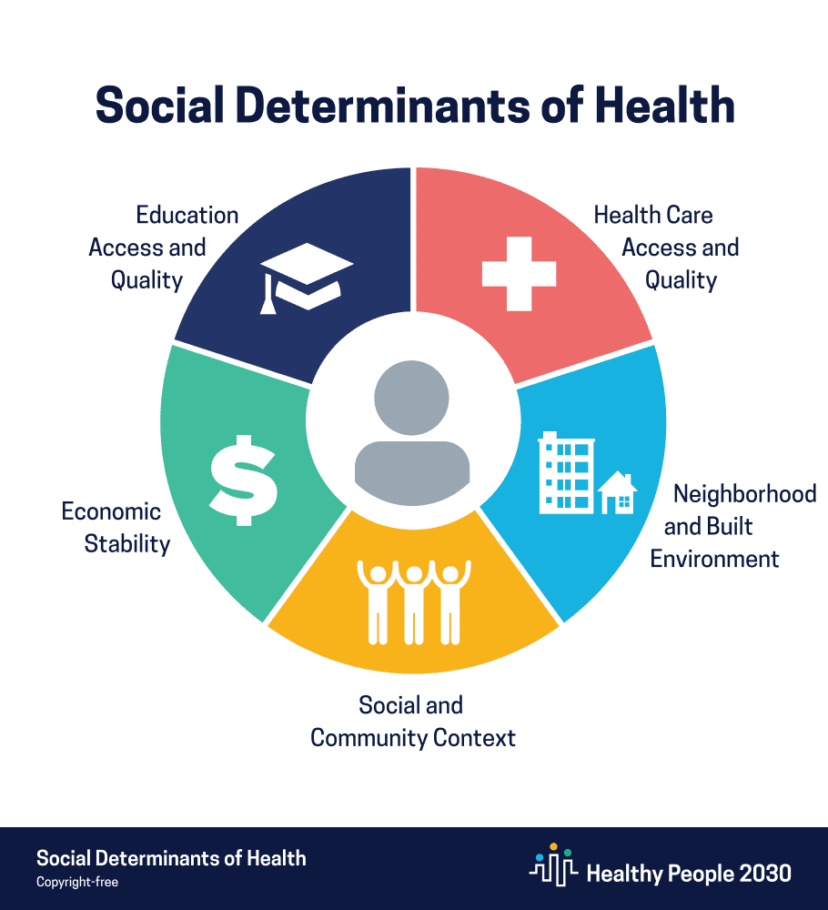
Addressing Social Determinants of Health in Independent Practice
Healthcare isn’t just about treating sickness—it’s about understanding and improving the factors that affect a person’s overall health. These factors, called Social Determinants of Health (SDOH), include things like income, education, safe housing, and access to healthy food. For independent healthcare providers, recognizing and addressing SDOH is an important part of giving patients the best care possible.
What Are Social Determinants of Health (SDOH)?

SDOH are non-medical factors that affect a person’s health. These include the conditions in which people live, work, eat, play, and age. Experts generally divide SDOH into five main categories:
- Economic Stability: Things like having a steady job, income level, debt, medical bills, and financial support.
- Education Access and Quality: Literacy, access to quality schools, early childhood education, and opportunities for college or job training.
- Healthcare Access and Quality: Having health insurance, being able to see a doctor, and getting care from providers who understand your culture and language.
- Neighborhood and Built Environment: Living in a safe neighborhood with access to transportation, parks, playgrounds, and good housing.
- Social and Community Context: Relationships with family and friends, support systems, involvement in the community, and dealing with issues like discrimination or stress.
Why SDOH Matters in Independent Practice

Independent providers often have closer relationships with their patients than big healthcare systems. This helps them understand the unique challenges their patients face. Considering SDOH can help providers:
- Provide Better Care: Knowing more about a patient’s life can lead to better diagnoses and personalized treatments.
- Improve Health Results: Addressing SDOH can prevent chronic illnesses, reduce hospital visits, and improve overall health.
- Close Health Gaps: Focusing on SDOH can reduce differences in health outcomes among different groups of people.
How Independent Providers Can Address SDOH

Independent providers need a thoughtful approach to tackle SDOH effectively. By looking beyond the medical aspects of care and into the life circumstances of their patients, providers can create meaningful change. Here are some practical steps to get started:
- Screen for SDOH: Use tools to ask patients questions about their housing, food, transportation, and other needs during visits. This can reveal problems that might be affecting their health.
- Work with Community Groups: Partner with local organizations like food banks, housing programs, and education services to connect patients with the resources they need.
- Educate Patients: Help patients understand how SDOH affects their health. Provide them with information about local services and teach them how to access support programs.
- Advocate for Change: Get involved in efforts to improve SDOH in your community. This could mean working with local leaders, joining health organizations, or raising awareness about these issues.
- Use Technology: Track SDOH data with electronic health records (EHR). This can help you identify patients who need extra help and design better care plans for them.
Conclusion

Addressing Social Determinants of Health isn’t just for big hospitals—independent providers have a key role in tackling these issues. By understanding SDOH and helping patients overcome related challenges, providers can improve health outcomes, reduce disparities, and build stronger, healthier communities.
Want to make a bigger impact in your patients’ lives? Start including Social Determinants of Health in your practice today. Contact us to learn about tools and resources to help you get started!
Sources
Andermann A; CLEAR Collaboration. Taking action on the social determinants of health in clinical practice: a framework for health professionals. CMAJ. 2016 Dec 6;188(17-18):E474-E483. doi: 10.1503/cmaj.160177. Epub 2016 Aug 8. PMID: 27503870; PMCID: PMC5135524.
Mostashari F. The Paradox of Size: How Small, Independent Practices Can Thrive in Value-Based Care. Ann Fam Med. 2016 Jan-Feb;14(1):5-7. doi: 10.1370/afm.1899. PMID: 26755777; PMCID: PMC4709149.
Social Determinants of Health. Social Determinants of Health – Healthy People 2030. (n.d.). https://odphp.health.gov/healthypeople/priority-areas/social-determinants-health
